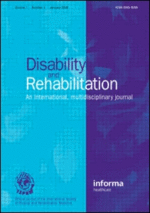Disability and Rehabilitation
Disability and Rehabilitation are interconnected fields that focus on enhancing the quality of life and functional abilities of individuals with disabilities. Disabilities can range from physical, cognitive, developmental, to psychiatric impairments that impact a person's daily activities and participation in society. Rehabilitation, on the other hand, encompasses a broad spectrum of services designed to restore or improve functioning, promote independence, and facilitate participation in society.
Definition and Types of Disabilities[edit | edit source]
A disability is defined as any condition that restricts a person's mental, sensory, or mobility functions. It can be caused by various factors, including genetic disorders, illness, accidents, or aging. Disabilities can be categorized into several types, including:
- Physical Disability: Impairments that affect a person's mobility or dexterity.
- Sensory Disability: Affects one or more of a person's senses, including hearing, seeing, and touch.
- Cognitive Disability: Impacts on a person's learning, memory, problem-solving, and attention.
- Psychiatric Disability: Affects a person's behavior, thinking, and emotional state.
Rehabilitation Services[edit | edit source]
Rehabilitation aims to enable individuals with disabilities to achieve and maintain optimal functioning in interaction with their environments. Services can be multidisciplinary, involving a team of professionals including physical therapists, occupational therapists, speech and language therapists, psychologists, and medical doctors. Rehabilitation services may include:
- Physical Therapy: Focuses on improving physical function through exercises, mobility training, and pain management.
- Occupational Therapy: Helps individuals develop or regain the skills needed for daily living and working.
- Speech and Language Therapy: Aims to improve communication skills and address swallowing difficulties.
- Psychological Counseling: Provides support for emotional and psychological well-being.
- Vocational Rehabilitation: Assists individuals in finding and maintaining employment.
Legislation and Rights[edit | edit source]
Various international and national laws protect the rights of individuals with disabilities, promoting their inclusion in all aspects of society. Key legislation includes:
- Americans with Disabilities Act (ADA): Prohibits discrimination against individuals with disabilities in all areas of public life in the United States.
- United Nations Convention on the Rights of Persons with Disabilities (CRPD): An international treaty aimed at protecting the rights and dignity of persons with disabilities.
Challenges and Future Directions[edit | edit source]
Despite advancements in legislation and rehabilitation services, individuals with disabilities often face barriers to full participation in society, including stigma, discrimination, and lack of accessibility. Future directions in the field of disability and rehabilitation include improving access to technology, enhancing community-based services, and promoting inclusive policies and practices.
See Also[edit | edit source]
Search WikiMD
Ad.Tired of being Overweight? Try W8MD's physician weight loss program.
Semaglutide (Ozempic / Wegovy and Tirzepatide (Mounjaro / Zepbound) available.
Advertise on WikiMD
|
WikiMD's Wellness Encyclopedia |
| Let Food Be Thy Medicine Medicine Thy Food - Hippocrates |
Translate this page: - East Asian
中文,
日本,
한국어,
South Asian
हिन्दी,
தமிழ்,
తెలుగు,
Urdu,
ಕನ್ನಡ,
Southeast Asian
Indonesian,
Vietnamese,
Thai,
မြန်မာဘာသာ,
বাংলা
European
español,
Deutsch,
français,
Greek,
português do Brasil,
polski,
română,
русский,
Nederlands,
norsk,
svenska,
suomi,
Italian
Middle Eastern & African
عربى,
Turkish,
Persian,
Hebrew,
Afrikaans,
isiZulu,
Kiswahili,
Other
Bulgarian,
Hungarian,
Czech,
Swedish,
മലയാളം,
मराठी,
ਪੰਜਾਬੀ,
ગુજરાતી,
Portuguese,
Ukrainian
Medical Disclaimer: WikiMD is not a substitute for professional medical advice. The information on WikiMD is provided as an information resource only, may be incorrect, outdated or misleading, and is not to be used or relied on for any diagnostic or treatment purposes. Please consult your health care provider before making any healthcare decisions or for guidance about a specific medical condition. WikiMD expressly disclaims responsibility, and shall have no liability, for any damages, loss, injury, or liability whatsoever suffered as a result of your reliance on the information contained in this site. By visiting this site you agree to the foregoing terms and conditions, which may from time to time be changed or supplemented by WikiMD. If you do not agree to the foregoing terms and conditions, you should not enter or use this site. See full disclaimer.
Credits:Most images are courtesy of Wikimedia commons, and templates, categories Wikipedia, licensed under CC BY SA or similar.
Contributors: Prab R. Tumpati, MD

